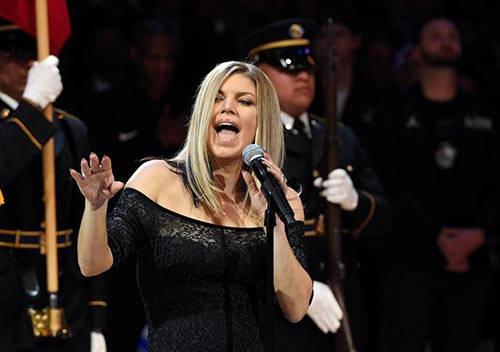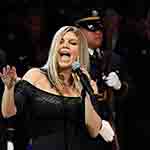
This isn’t a post to rehash the USA controversy around Fergie’s singing of “The Star-Spangled Banner” during the 2018 NBA All-Star Game. This is segueing from that to leading worship.
When we lead worship, are we doing that within the community? With the community? For the community? Or, to the community?
It seems to me that liturgy is something we do together. When Jesus says, “Do this”, what is not so clear in English is obvious in the New Testament’s original Greek: the “do” is plural (τοῦτο ποιεῖτε). Doing rituals to people is magic. It is debated whether the word “liturgy” originally derived from “work of the people” or “work for the people”, but if it means the latter, the “for the people” means the whole worshipping community doing this for the wider community, for the “world”, for those beyond the worshipping community.
So often, I get the impression of a show, or of this being the worship leader’s possession, or even of people coming to observe the piousness of the presider!
But, actually, this is our shared worship, what we do together. And if we do this together – it is because we have agreed to it; it is not about so much about surprises; it is not so much about a drama that the presider enacts for the congregation… it is not primarily about the presider presenting a string of pious prayers that have moved him/her this last week…
In NZ Anglicanism, when we gather for the Eucharist, this sense of sharing in what we have agreed to do together has been stretched to breaking point. All that remains is an agreement on the “shape” of a Eucharist service – but each community, each celebration (in fact) can be a completely different service, with completely different words. There are only some minimum words required for the Eucharistic Prayer (and you can use any Eucharistic Prayer authorised anywhere in the Anglican world). Absolutely everything else can have no connection whatsoever with any other celebration of the Eucharist anywhere else or even in the same place at another time.
Check it out here. [And then here].
Originally, this flexibility was specifically “for particular occasions and not for the regular Sunday Celebration of the Eucharist”, but this rubric was removed, and the powers that be decided that puting “careful preparation” in bold in the line (already there) “This rite requires careful preparation by the presiding priest and participants” was sufficient.
I regard every person present as a participant, but seldom, when this liberty is followed, have I seen careful preparation with everyone. My original point still holds, however. Worship is something we do together.
It is fascinating watching from a distance the discussions in The Episcopal Church about possible revisions of their Book of Common Prayer. Many, clearly, still understand this primary dynamic that liturgy is worship we do in common.
If you appreciated this post, do remember to like the liturgy facebook page, use the RSS feed, and signing up for a not-very-often email, …




Because you lifted Eucharist up as an example of Liturgy, I would like to point you to a recent funeral sermon by, now retired, Father Tobias Haller, BSG. I just think that it’s very good and like so much from Tobias, is succinctly said with the fewest possible words.
http://blog.tobiashaller.net/2018/02/celebrate-feast.html
Thanks, David. Yes – I too am a fan of Fr Tobias and his writing. Blessings.